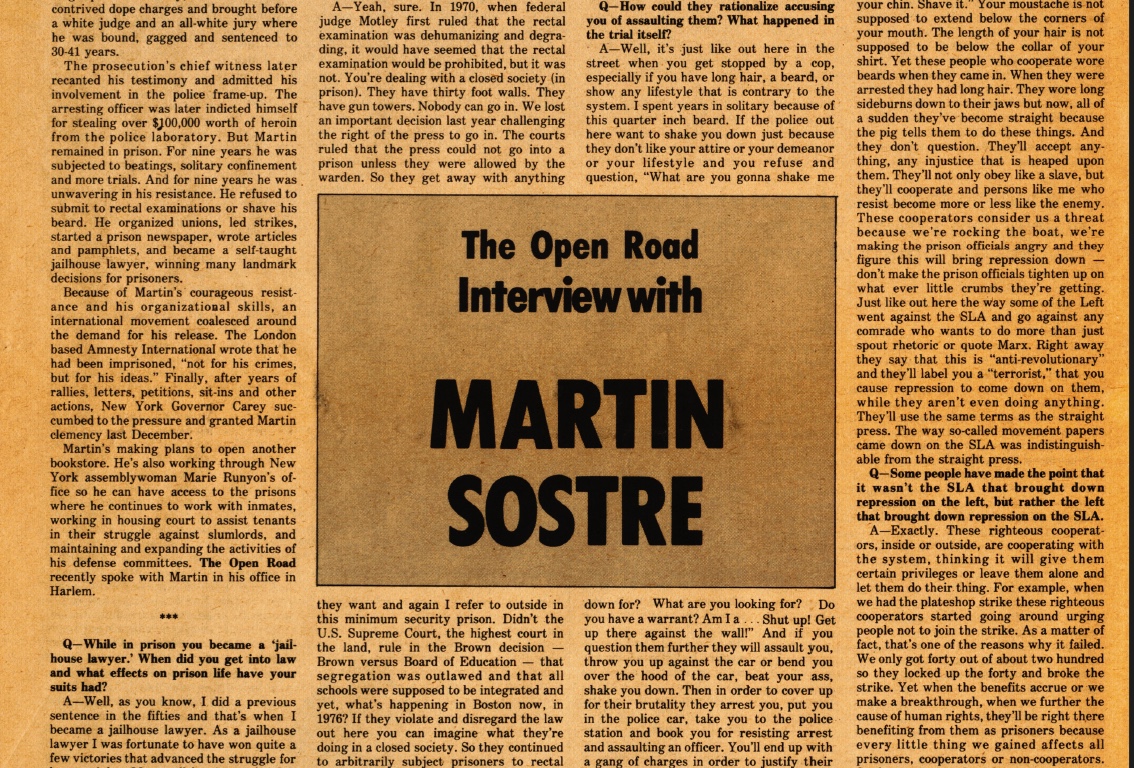In January 1976, Martin Sostre was released from prison after serving nearly eight of a 31-41-year sentence. In response to a growing international defense movement, a documentary film, and a book detailing his frame-up by Buffalo police and his ongoing struggles against state violence, Governor of New York Hugh Carey finally granted his clemency on Christmas Day 1975.
In the first ever issue of Open Road—which interviewer David Spaner later described as a paper aiming to cover the “entire spectrum of the anti-authoritarian left,” in order to “create a community or a resurgent anarchist movement”—Sostre and Spaner covered a range of topics, including revolutionary anarchism, prisoners’ unions, yoga, defense campaigns, and jailhouse lawyering.
The Open Road interview is one of the most extensive interviews Sostre ever recorded. It was conducted in two sessions (after an issue with Spaner’s recorder the first time) at Sostre’s office in Harlem, where he worked briefly for Assemblywoman Marie Runyon upon his release. Most significantly, the interview represents the most comprehensive account of Sostre’s views on anarchism. In it, Sostre collapses the difference between “prisoners’ rights” and “human rights” and argues that society outside the walls is simply “minimum security.” Indeed, despite his commutation that year, he remained on parole until 2001. “Being on parole I’m merely out on a leash,” he noted. “They can pull the leash back.”
Central to Sostre’s anarchism were the principles of individual liberty and bodily sovereignty. “To me, the struggle for liberation, which is used loosely, ultimately boils down to the individual exertion of his or her faculties to the fullest extent. I don’t care what ideology you have, it isn’t good if it doesn’t afford a person, first, personal freedom on its most basic personal individual level.” Having been beaten nearly a dozen times for refusing to shave his ¼ inch length beard and to submit to rectal searches while in solitary confinement, Sostre emphasized that, “they destroyed my bookstore and they had me in a cage but one thing they could never take was my personhood and my personal freedom and that was what I held onto all those years.”
He described anarchism as, “the spontaneity of the people,” and saw it as a natural response to oppression through which revolutionary deeds would inflame others to resist and organize. “All through history,” he told Spaner, “the anarchists have been the detonators.” Sostre argued that anarchism has always thrived upon “deeds instead of words, on action instead of inaction.”
Sostre ended the interview with a heartfelt thanks to the hundreds of people who worked diligently to emancipate him from prison. “It was the sum total of all this activity that finally forced the repressive State to disgorge me from the dungeons. Otherwise I would have been killed because I absorbed eleven beatings and I know that the cumulative effect of that eventually would have gotten to me and destroyed me.”
